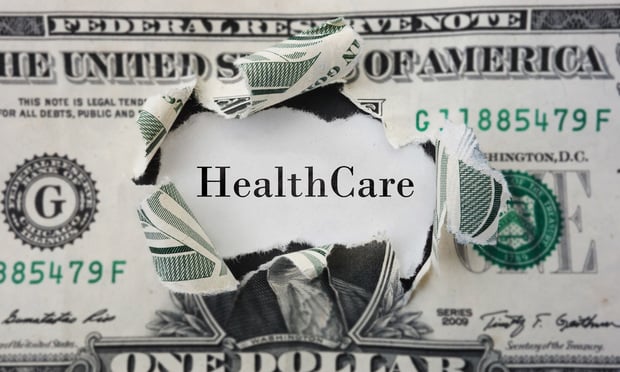 Adopting the changes proposed for 2020 could hurtmiddle-income consumers, who have to pay the full retail price forexchange coverage and “undermine the limited progress madethus far in stabilizing the market,” Verma wrote. (Photo: Centersfor Medicare and Medicaid Services)
Adopting the changes proposed for 2020 could hurtmiddle-income consumers, who have to pay the full retail price forexchange coverage and “undermine the limited progress madethus far in stabilizing the market,” Verma wrote. (Photo: Centersfor Medicare and Medicaid Services)
House Democratic leaders have revealed that SeemaVerma, the Trump administration official directly in charge ofoverseeing Affordable Care Act rules and programs, is trying tohelp people with ACA public exchange plan coverage keep their coverage.
|Verma — President Donald Trump's administrator of the Centersfor Medicare and Medicaid Services (CMS) — predicted in August thatsome ACA public exchange program changes proposed by otheradministration officials could cut exchange plan enrollment byabout 1 million in 2020 and later years.
|She recommended that the administration stick with the 2019exchange program rules, to help people stay covered.
|Read more: Agents, brokers abandoning ACAexchanges
|Adopting the changes proposed for 2020 could hurt middle-incomeconsumers, who have to pay the full retail price for exchangecoverage; “undermine the limited progress made thus farin stabilizing the market; and set back the Administration'spriorities of devolving power to states, increasing affordability,and expanding consumer choice in health insurance coverage,” Vermawrote in the memo.
|She wrote that some of the health system changes theadministration has adopted or proposed, such as giving states moreflexibility to change ACA rules and programs for their residents,depend on consumers having access to a stable individual healthinsurance market.
|The Trump administration is still considering two of theproposed changes and has adopted one.
|Three House leaders — House Energy and CommerceChairman Frank Pallone Jr.; House Ways and Means Chairman RichardNeal; and House Education and Labor ChairmanBobby Scott — included a copy of Verma'smemo in a letter sent to Alex Azar II, the secretary of the U.S.Department of Health and Human Services (HHS).
|The lawmakers say they found Verma's memo when they asked HHSfor materials related to the position of HHS on a federal suit that could give the U.S. Supreme Courta chance to strike down all of the Affordable Care Act.
|CMS officials were not immediately available to comment on thelawmakers' letter.
|The proposed changes
The changes under consideration in August 2018 were:
|1. Ending 'silver loading': The ACA publicexchange system was originally supposed to pay insurers extra cashto help insurers reduce deductibles, co-payments and coinsuranceamounts for low-income exchange plan users. ACA opponents inCongress cut off funding for the “cost-sharing reduction” programsubsidy payments to insurers.
|Some states and insurers have been getting around thecost-sharing reduction subsidy cut by increasing the full retailcost of mid-level, “silver level” coverage, with the understandingthat most of the purchasers of that type of coverage will below-income people, who will be able to use federal ACA premium taxcredit subsidy help to limit their monthly payments for healthcoverage.
|Verma predicted in her memo that ending silver loading could cut2020 exchange plan enrollment by about 300,000, or about3 percent.
|2. Endingauto-enrollment: HealthCare.gov has been helpingpeople who already have ACA exchange plan coverage renew theircoverage without doing anything.
|Eliminating auto-enrollment could cut 2020 exchange planenrollment by about 200,000, or about 2 percent, accordingto Verma's memo.
|3. Changing the rules for calculating ACA premium taxcredit subsidy amounts: More than two-thirds ofexchange plan users qualify for ACA premium tax credit subsidies topay for their coverage. For most tax credit users, the tax creditshave the effect of reducing monthly cash payments for coverage.
|Verma estimated in the memo that the premium indexing rulechange could cut 2020 exchange plan use by about 600,000, or6 percent.
|What the administration has done
HHS moved in April to adopt the new premiumindexing rules for 2020.
|Officials said they are still considering the auto-enrollmentand silver-loading proposals.
|The House leaders have objected to the idea of theadministration going ahead with the auto-enrollment andsilver-loading proposals, and asked why the administration wentahead with changing the premium indexing rules even though Vermapredicted the new rules would cut the number of people withcoverage.
|Resources
A copy of the House leaders' press release, a link to Houseleaders' letter, and a link to a copy of the Verma memo areavailable here.
||
Read more:
Complete your profile to continue reading and get FREE access to BenefitsPRO, part of your ALM digital membership.
Your access to unlimited BenefitsPRO content isn’t changing.
Once you are an ALM digital member, you’ll receive:
- Critical BenefitsPRO information including cutting edge post-reform success strategies, access to educational webcasts and videos, resources from industry leaders, and informative Newsletters.
- Exclusive discounts on ALM, BenefitsPRO magazine and BenefitsPRO.com events
- Access to other award-winning ALM websites including ThinkAdvisor.com and Law.com
Already have an account? Sign In
© 2024 ALM Global, LLC, All Rights Reserved. Request academic re-use from www.copyright.com. All other uses, submit a request to [email protected]. For more information visit Asset & Logo Licensing.








